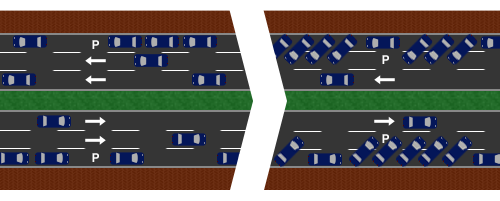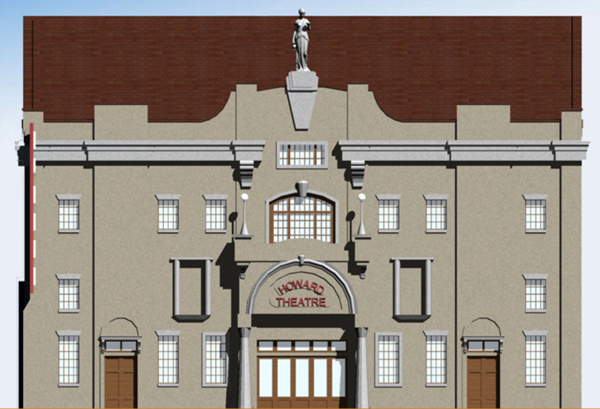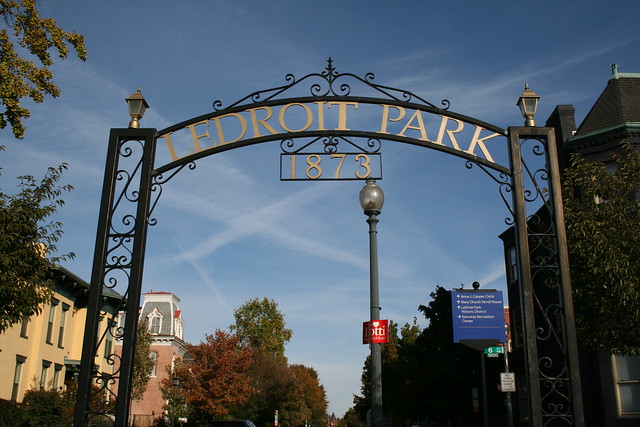Street sweeping resumes Monday
The Department of Public Works, which collects trash, plows snow, and issues parking tickets, will resume street sweeping on Monday, March 16. If you park on the street, be sure to move your car according to the street sweeping signs posted on each street.
Street sweeping ended in October and several of our streets desperately need cleaning.
Updates: Howard, parking, planning, and the civic association
A few brief neighborhood updates:
Parking passes extended to the end of the year
The District has extended the expiration date of our visitor parking passes from September 30 to December 31.
Two groups downgrade Howard University
Moody’s, the bond-rating agency, has downgraded Howard University debt from A3 to Baa1, one notch above junk status. The agency cites worries over the financially foundering hospital, which ran up a $21-million loss last year. Other university departments, however, posted a combined $33-million surplus after the university’s aggressive cost-cutting measures last year.
U.S. News and World Report downgraded Howard University’s ranking by 22 slots to 142nd place. The magazine publishes its annual opinion of the “best colleges” in the nation, though there is plenty of criticism of the magazine’s methodology.
OP and DDOT to unveil the Mid City East draft plan Thursday
The Office of Planning and DDOT are holding an open house tomorrow to unveil their Mid City East small area plan proposal. The agencies launched the Mid City East Initiative last year “to holistically plan for transportation, commercial revitalization, redevelopment, historic resources, sustainability and parks and open space.”
The open house is tomorrow, Thursday, September 26 from 6:30‐8:30 pm at the McKinley Tech Auditorium (151 T Street NE) in Eckington.
LeDroit Park Civic Association will elect new officers next month
The association will elect new officers at its October meeting. The positions up for election are president, vice president, treasurer, and secretary. Any paid member may run and vote. Not a member? Join today!
The October monthly meeting is on Tuesday, October 22 at 7 pm in the basement of the Florida Avenue Baptist Church (enter on U Street).
Howard Theatre encourages private parking
To reduce the liklihood that patrons will park on residential streets around the Howard Theatre, the theatre will sell prepaid private parking through Ticketmaster. The passes are for private lots owned by Howard University and other private owners.
In fact, we were looking on Ticketmaster at prices and availability for April’s Wanda Sykes show and spotted this prominent parking add-on at the bottom:

The lots described above are as follows:
- Valet shuttle Lot B – Howard University’s large parking lot at Georgia Avenue and W Street.
- Self-parking Lot A – Howard University’s HURB-I parking lot at 7th & T Streets.
- Premier Valet – private triangle lot at T Street and Florida Avenue, across from the theater.
When Progression Place, the office and apartment project at the Shaw Metro, finally opens, the theatre will lay claim to a significant number of the project’s underground parking spaces during nighttime hours, thus adding a another option.
Should DC allow more angle parking on Sunday mornings?
Councilmember Harry Thomas, Jr. (D — Ward 5) introduced a bill to ease Sunday parking tensions by permitting angle parking for religious institutions with ANC and DDOT approval. The councilmember held a forum on the bill and its companion commercial district bill last week.
In DC neighborhoods where street parking is at a premium, few things raise a resident’s ire like church congregants who park illegally on Sunday mornings. Congregants who drive from other parts of the District, from Maryland, and from Virginia have been known to double-park, park in alleys, block crosswalks, and block fire hydrants.
After receiving numerous complaints from residents, Mr. Thomas introduced the bill to primarily allay residents in Bloomindale and Eckington. Since these neighborhoods are among Ward Five’s most densely populated, they, like LeDroit Park, suffer from high street parking occupancy. Last week in Eckington, Mr. Thomas hosted a forum on his bills and took questions from residents.
Mr. Thomas acknowledged what residents have long known: parking enforcement around churches is intentionally lax on Sundays. Though Mr. Thomas admitted the unique challenges to transportation on Sunday mornings, he also decried congregants who park illegally, block residents in, and hinder public safety.
Transit service reaches its nadir on Sunday mornings, and churchgoers often travel to churches in residential neighborhoods with light Sunday service. Since transit service and car traffic are relatively low on Sunday mornings, Mr. Thomas thinks DDOT will be able to find instances of roadways wide enough to accommodate both angle parking and through traffic on Sunday mornings. In each case, though, DDOT will make the final determination of what is safe and permitted, even if an ANC supports the petition.

Left: typical curbside parking. Right: possible angle parking
We asked Mr. Thomas why he singled out angle parking and not other non-traditional parking arrangements and he admitted that the bill was just a first draft and could be expanded to include other measures.
For instance, DDOT permits parking beside the median on Sundays on the 1300 and 1400 blocks of New York Avenue NW downtown. This arrangement works since there is still one lane available for through traffic and since Sunday morning traffic flows are small. A similar arrangement might work along other multi-lane avenues in the District, including Rhode Island Avenue.
In other cases, solutions could be less radical. The congregants of several churches on Florida Avenue park in the right lane on Sunday morning even where parking is never permitted at any time. DDOT may be able to simply change the signs and permit curbside parking in such places on Sunday mornings. The extra parking can act as a traffic-calming measure, though, as we know, easier parking can induce more driving.
No matter what happens, the Department of Public Works, the primary agency in charge of parking enforcement, needs to end its practice of lax Sunday enforcement near churches. Only DDOT, not pastors and not congregants, should make the determination as to what constitutes safe Sunday morning parking. Mr. Thomas acknowledged that the law needs to be enforced uniformly as it is unfair to overlook, as one resident noted, illegal parking in residential neighborhoods, while actively ticketing illegal parking downtown on Sundays.
Though residents expressed frustration with some, though not all, neighborhood churches, Mr. Thomas rightly advised residents that parking tensions need not be adversarial. In fact, he called attention to instances in which neighborhood residents and churches collaborated to resolve parking problems. This can include urging pastors to rent unused lots for their congregants or to provide shuttle service from satellite lots or from congregants’ homes. He even touted bikesharing several times but said it is not practical for everyone.
Whatever the solution, Mr. Thomas admitted the bill was in its infancy and that he wants to provide a template for cooperation; angle parking may be one of many possible solutions.
Mr. Thomas was eager to mention the companion bill to allow permanent angle parking in business districts. Though most meeting attendees were there to complain about church parking in residential neighborhoods, Mr. Thomas said that many Ward 5 businesses depend heavily on customers arriving by private car. However, when he asked a local business owner how much of his business is from outside his neighborhood, the owner said that very little came from elsewhere.
The business corridor bill is significantly different from the Sunday parking bill. The former would permit businesses to seek diagonal parking at all times, regardless of transit service, or if the street space could be reallocated to bike lanes or wider sidewalks.
The Sunday parking bill carries more merit than the business corridor bill because of the unique circumstances of church locations and Sunday transit service. The business corridor bill, in contrast, too hastily and disproportionately prioritizes parking to the detriment of other road uses.
Howard Theatre Renovation Begins in August

At Thursday’s ANC1B meeting, Chip Ellis, head of the Howard Theatre’s restoration, announced that the much-delayed renovations will start in the last week of August. The theater, when it opens, will host R&B acts, jazz, and Sunday gospel brunches in a venue that Ellis describes as “cabaret style”.
Careful observers of the restoration sketch (above) will notice the statue at the top of the façade. Originally the theater featured a statue of Apollo playing the lyre; the new statue, fabricated in metal and lit with LEDs will be themed “the Jazz Man”. Mr. Ellis will return in a few months with design drawings.
When asked about parking, Mr. Ellis stated that the restoration project plans to partner with Howard University to offer parking in one of its lots a few blocks away on Georgia Avenue. He also proposed the idea of building a garage on the southern portion of the parking lot of Howard University Hospital.
We appreciate Mr. Ellis’s efforts restoring the Howard Theatre, but we would not welcome a parking garage on Georgia Avenue. A garage would contradict the Office of Planning’s DUKE Plan, which specifically calls for ground-floor retail and offices on that site. A street-fronting garage would deprive Georgia Avenue of the streetlife that retail uses generate.
Furthermore, since parking is a necessary component of driving; providing more parking will induce more driving, something the area suffers from already.
Can There Be Too Much Parking?
Yes.
There’s an article in the Post about the DC USA parking garage in Columbia Heights. DC USA, as you probably know, is the urban mall at 14th and Irving Streets NW and contains Best Buy; Target; Bed, Bath & Beyond; Staples; and Radio Shack among other stores. The city helped bring the project to fruition by shelling out $40 million for a 1,000-space garage beneath the building. Underground parking is much more expensive to build than parking lots due to the excavation and increased construction costs.
Despite the fact that the mall is located at a metro station and is within walking distance of some of densest neighborhoods in the region, traffic studies at the planning stage predicted much more car traffic than has actually materialized.
We have read elsewhere that those predictions further cemented support for the garage from neighbors who feared that customers would clog Columbia Heights in search of scarce parking. Furthermore, as the article implies (but doesn’t state directly), part of the city’s motivation to finance the garage was due to Target’s fear that customers will not shop at a store with few parking spaces. While this fear is certainly justified in, say, Rockville, it is ill-suited to a dense neighborhood like Columbia Heights, which is well-served by numerous bus and metro lines.
Despite the fact that parking in the garage is a bargain ($1/hour), few customers find it necessary to drive to DC USA, let alone park there. In fact the garage has never exceeded 47% capacity, causing the District to lose $100,000 a month for parking spaces that should never have been built.
Similarly, we have learned before in private discussions with apartment developers in College Park that developers have had to go to considerable expense to build parking garages and lots for student housing adjacent the University of Maryland campus simply because the P.G. County planning department couldn’t conceive that anybody would walk anywhere from an apartment building. At a cost of $22,000 – $50,000 per space for structured parking, the costs are passed onto renters whether they needed the parking or not.
When new developments are proposed, especially near the Shaw Metro station, the city and residents should be careful not to demand too much underground parking as this may deter development and needlessly raise costs that are eventually passed onto shoppers and tenants.









Recent Comments